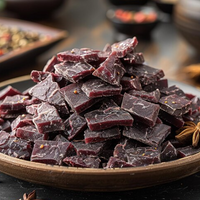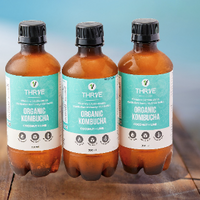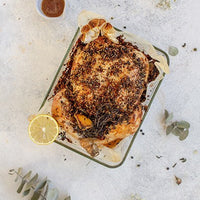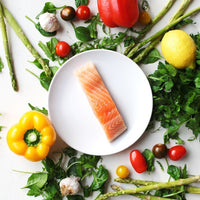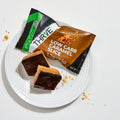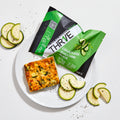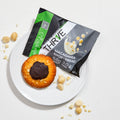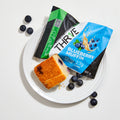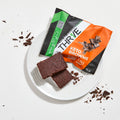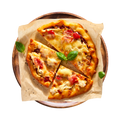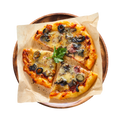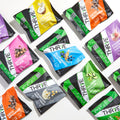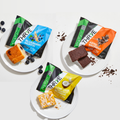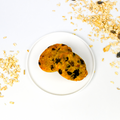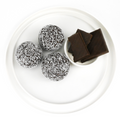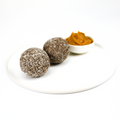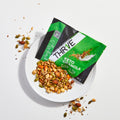You’ve smashed out a gym session and need a feed. Sure, we all know a jumbo serve of fries ain’t ideal, but of the abundance of healthy choices, what’s the best for boosting those workout #gains? We’ve got the most nutritious and delicious picks to help you refuel.
 Firstly though: how long should you wait to eat? “The best time to eat is anywhere from 1-3 hours after your workout,” advises THR1VE Nutritionist Shannon Young. “Once you’ve finished your workout your body is still ‘working’ and will not utilise the nutrients as efficiently as it could. Consuming food right after your workout can leave you sluggish and lead to stomach discomfort. All your blood has rushed to other areas (such as your muscles to replenish) and isn’t concentrating on your digestive system. The last thing you want is your workout habits to hinder your digestion process!”
Firstly though: how long should you wait to eat? “The best time to eat is anywhere from 1-3 hours after your workout,” advises THR1VE Nutritionist Shannon Young. “Once you’ve finished your workout your body is still ‘working’ and will not utilise the nutrients as efficiently as it could. Consuming food right after your workout can leave you sluggish and lead to stomach discomfort. All your blood has rushed to other areas (such as your muscles to replenish) and isn’t concentrating on your digestive system. The last thing you want is your workout habits to hinder your digestion process!”
Depending on your diet, this 1-3 hour period is also an ideal time to consume any carbs, too. This is when they can most efficiently replenish your glycogen – this is what your muscles have been using for fuel during your workout. So now you know when to eat – what should you be munching on?
Eggs
Want to bulk? Don’t ditch the yolk! A recent US study found eating whole eggs after a resistance workout was more effective for muscle building and repair than eating egg whites. In fact, the “muscle-building response” was 40% greater in whole egg eaters than those who consumed the exact same amount of protein from egg whites. Plus, eating the whole egg means an extra dose of healthy fat, too.
Young agrees: “Eggs are a great option because they’re high in protein and are a good source of key nutrients, both of which will facilitate your body’s ability to repair after an acute gym session. Eggs also contain all eight essential amino acids needed for optimal muscle recovery, plus valuable minerals like calcium, zinc and iron.”
Salmon
The secret to salmon’s muscle-building power is that it’s a good source of a protein and omega-3 at once. “When protein is consumed with omega-3s, your body shows an increase in amino acids, which it uses to build new protein tissues, especially skeletal muscles,” Young explains.
Consuming fatty fish such as salmon can also have powerful anti-inflammatory effects. This can help with everything from mild injuries to preventing more serious chronic disease in the long-term. Aim for two serves a week – we love it with a side of seasonal greens.
Sweet Potatoes
Have you ever been mid-workout, only to be struck down by a nasty muscle cramp that has you limping out of the gym? Sweet potatoes could help. “They are high in the electrolyte potassium, which can help ward off muscle cramping during exercise,” Young advises. Bananas are another good way to get Potassium. As Sweet Potatoes are a good carbohydrate source, the best time of the day to eat them is post-workout. Enjoy them roasted, in a mash or thinly sliced, toasted and topped with a spread! Yep, sweet potato “toast” is a thing.
Turmeric
This yellow spice from the ginger family packs a serious anti-inflammatory punch! “Turmeric can reduce exercise induced inflammation, decrease oxidative stress and support your joints from wear and tear,” says Young. Studies have found its anti-inflammatory effects can help even serious inflammatory conditions such as Rheumatoid Arthritis (Frontiers in Nutrition, 2017).
That’s not the only plus though, Young says. “Turmeric can also improve mental capacity – the healthier our brain, the more likely we are to be focused on all areas of our life, including finishing that workout!” Bonus: turmeric is great for spicing up a side or a curry.
Quinoa
This gluten-free source of carbs is great after a workout. “Quinoa is a complete protein which means that it contains all eight essential amino acids that your muscles need for growth and repair,” says Young. You could pair it with chicken or fish for a double hit of protein post-workout. Bonus: “Quinoa is also packed with B vitamins for energy, calcium and magnesium to support the nervous system and iron needed to transport oxygen around the body,” Young points out.
Water
Okay, it isn’t a food – but worth consuming nevertheless! “Failure to hydrate properly is a common mistake and can inhibit your results dramatically,” says Young. To find your required daily intake in litres, Young says to multiply your bodweight in kilos by 0.033. So 0.033 x 65kg = 2.1 litres. “That is your base intake, then drink about an extra litre per hour of intense workout.” How’s that for handy maths?
Original image from Pinch of Yum

